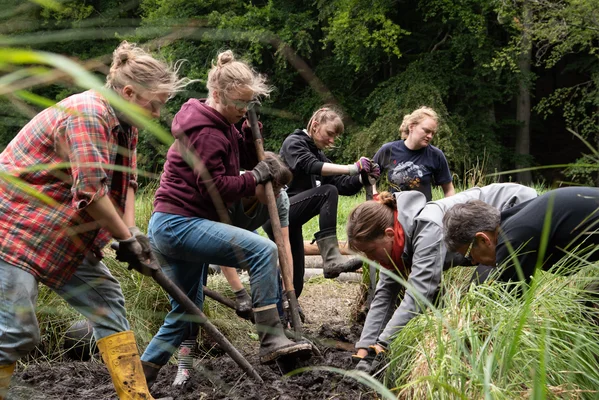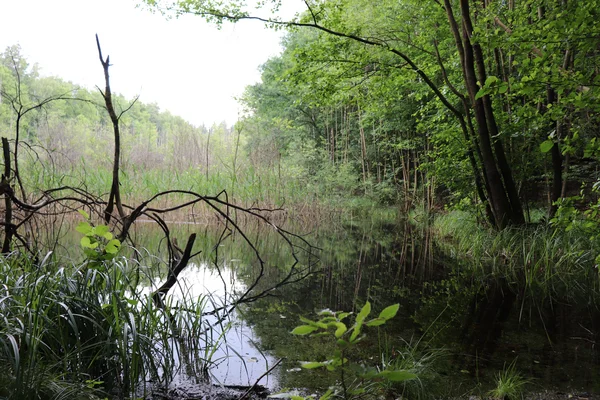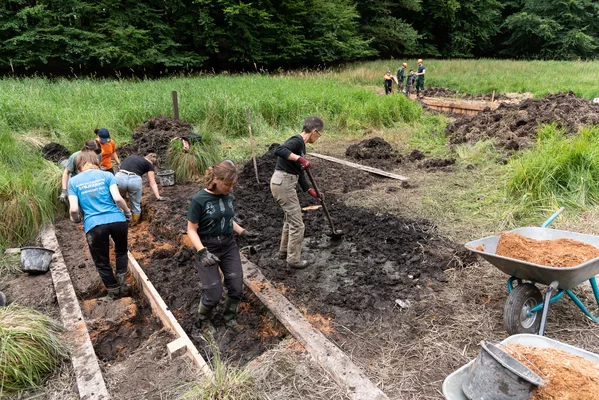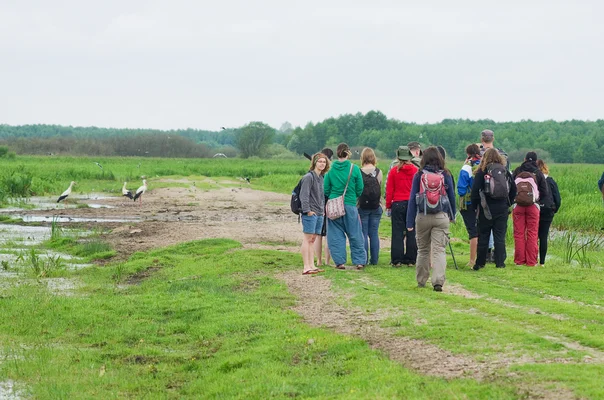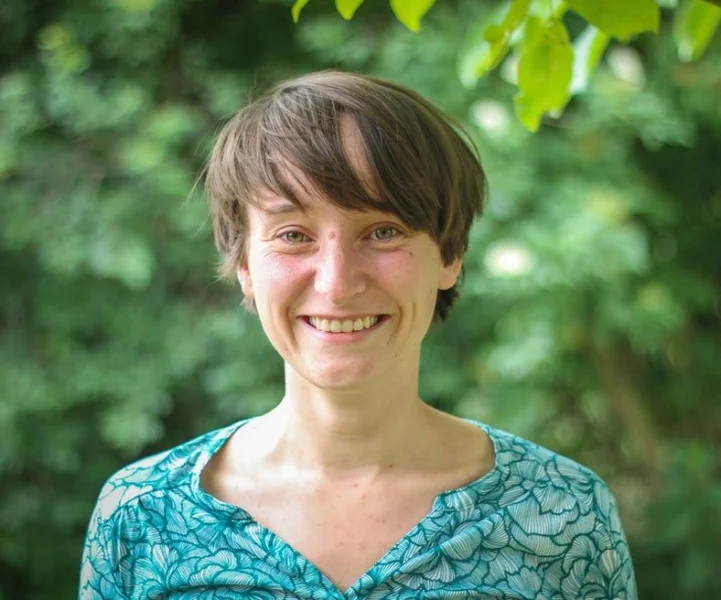Individual study contents
You will complete your studies in Landscape Management and Nature Conservation after six semesters. Afterwards, you can either enter the workforce directly or continue your education with a Master’s degree. During the first third of the programme, you will focus exclusively on foundational knowledge. Starting in the third semester, you will begin your practical study semester (internship phase). The fourth, fifth, and sixth semesters make up the specialised coursework, during which you can choose compulsory elective modules and complete a thematic final thesis in the sixth semester.
As part of the programme, you also have the option to specialise in → Protected Area Management.
Modules per semester
In the foundation phase of the programme (first and second semesters), the focus is on teaching the fundamentals of the natural sciences.
You will gain foundational knowledge of the abiotic components of landscapes—soil, hydrology, geology, geomorphology, and climate—and how they interact. You apply landscape-related questions and acquire methodological skills within each of these disciplines.
This module introduces key characteristics of major taxonomic groups in the animal and plant kingdoms. It explores the relationships between morphology, lifestyle, and ecology of organisms, and examines the core concepts, objectives, guiding principles, legal frameworks, and administrative structures of nature conservation.
After completing this compulsory module, you will be able to identify ecosystem components and interactions, and make detailed, interdisciplinary connections to sustainable development. You will also gain a solid understanding of key sustainability-related debates and discussions.
This module focuses on the legal foundations of nature and environmental protection, as well as administrative procedures. You become familiar with the spatial planning system in Germany and the environmental assessment procedures for spatially relevant projects.
Learn essential scientific skills, their interdisciplinary applications, and collaborative processes involved in producing scholarly work.
In the foundation phase of the programme (first and second semesters), the focus is on teaching the fundamentals of the natural sciences.
In this module you will develop an understanding of ecosystem functioning and the integration of societal demands for landscape use. You will also learn to think in terms of landscape contexts and become familiar with methods for identifying and assessing landscape subareas.
You will learn the fundamentals of soil functions, soil types, and soil processes, as well as the ecological functions and quality of water bodies. You will understand classifications and patterns of flora and their significance for nature conservation assessment. You will be able to relate the vegetation composition of a landscape to abiotic site characteristics.
Learn about the interactions between diverse animal species and their environments. Attend scientific seminars focusing on selected species relevant to land use and nature conservation. Complete practical courses on various animal indicator groups and their monitoring.
You will be able to map soils and understand their relationship with site conditions (e.g., landscape water, relief) and land use. You will become familiar with assessment parameters and methods used in the field and laboratory. You evaluate results based on agricultural and nature conservation criteria and learn to derive development and management objectives accordingly.
You will learn about the development history and characteristics of human-influenced landscapes, analysing landscapes—including rural settlements—using maps, geodata, and field surveys. From this, you will derive maintenance and development concepts.
You will learn identify conifers and deciduous trees as well as grasses and mosses. Additionally, you will become familiar with methods of vegetation analysis and deepen your knowledge of animal identification.
The module is recommended for the specialisation in Protected Area Management.
During the Bachelor's degree programme, students specialising in the Conservation Area Management focus specifically on this topic. The practical semester (3rd semester) is completed at a suitable institution at home or abroad, for example with a nature conservation service. Both the project work (5th semester) and the final thesis (6th semester) must address current issues in conservation area management.
You can find information on the work area of protected area management as well as the requirements and application process for the specialisation on the → specialisation page.
In the third semester, a work-related internship takes place, focusing on habitat mapping, landscape analysis, and practical landscape management.
You will learn the fundamentals of communication and public relations. The module provides an understanding of public relations as a management task and the systematic planning of PR campaigns. Psychological basics of human behaviour in the human–nature relationship, the importance of interdisciplinary perspectives on people and the world, as well as values and ethics, are also covered.
You will apply, reflect on, and deepen the factual and methodological knowledge acquired in the first year within subject-specific and practical contexts. You practice communication and argumentation in a professional environment and team. The planning and execution of assigned tasks is coordinated with your supervisors.
As part of the → Specialisation in Protected Area Management, the internship must be completed in a relevant institution, such as a nature conservation authority.
Starting from the fourth semester, you begin your specialised studies by selecting advanced compulsory elective modules to deepen your focus within your degree programme.
This module explores the tension between the landscape as an ecosystem and the use of natural resources by human society. Current challenges (including climate change, biodiversity loss, and soil degradation), landscape and land-use change, and strategies for sustainable management are key topics covered.
Learn essential data handling techniques and their interdisciplinary application. By the end of the module, you will be able to collect, analyse, and visualise data scientifically.
Acquire basic knowledge of sustainable forms of agricultural, forestry, and tourism land use within the context of current challenges such as climate change and biodiversity loss. Understand the constraints under which land users operate. Analyse conflicts and synergies arising from the protection and sustainable use of ecosystems.
This module is designed as a self-organised and independent work process. It includes the evaluative analysis of a landscape section in the vicinity of the study location. Identify the natural regional context and area characteristics, carry out a nature conservation assessment, and record usage and management requirements. You will practice applying methodological tools and scientific procedures.
You will expand on your foundational knowledge from "GIS Basics". Develop and implement independent project work involving spatial research questions or planning tasks using GIS. Gain an understanding of the fundamental requirements and possibilities of CAD-supported open space planning and learn how to apply its content and functions. Basic knowledge is provided as a foundation for independent further learning.
This module focuses on gaining clear insights into public opinions and attitudes. "Ecological action" does not begin with the physical components of ecosystems, but rather with individuals and groups. Using the example of changing landscapes (e.g. the Lüneburg Heath), you will complement object-based approaches to landscape with a subject-oriented perspective.
You will learn how to survey grassland stands and assess them based on agricultural and conservation criteria. You discuss development goals for the stands and derive appropriate management recommendations.
Like the fourth semester, the fifth semester also serves to further specialise your studies through the selection of advanced compulsory elective modules.
You will now become familiar with analytical and assessment methods used in landscape planning and environmental impact assessment. You will evaluate the relevance and validity of key assessment approaches and apply them independently at a basic level.
You will learn about methods for species and habitat protection, use, and development, incorporating conservation requirements, land-use restrictions, legal frameworks, and measures to achieve nature conservation goals, such as those set out in the EU Habitats Directive and Water Framework Directive.
In this module on economics, you will gain an understanding of human decision-making and interaction, and critically reflect on economic and socio-political mechanisms for the efficient allocation of scarce societal and natural resources. You will be able to identify and contextualise the foundations and objectives of entrepreneurial decision-making and confidently apply key business and management concepts.
In the project module, you will work on a practical task drawn from the fields of nature conservation or sustainable landscape use. Working with external partners, you will develop goal-oriented solutions within a defined timeframe.
You will take part in a simulation of a Conference of the Parties (COP) to an international environmental agreement (UNCCD). In this role-play, you will represent a country and advocate for its interests. The task challenges you to find a balance between national priorities and the goals of the international community, while learning how to negotiate and reach compromises.
Landscape is a shared space — which brings many communication challenges. Where interests and demands intersect, stakeholders must develop common visions for how the landscape can be shaped. Effective communication strategies are essential to avoid becoming trapped in individual perspectives. This is what you will learn in this module.
Protected area management Elective module | Part of the specialisation in protected area management
This module provides a comprehensive insight into the professional field of protected area management. You will learn about the historical development and current trends in protected area stewardship, participate in conflict management training, and explore public relations in nature conservation. Three days of field excursions offer intensive opportunities to engage with professionals and gain firsthand experience of the tasks and demands involved in protected area management.
This module covers the types and ecological characteristics of mires, water bodies, and floodplains, as well as key methods for assessing their condition. You will gain an overview of conventional and alternative management approaches.
This module is recommended for the Protected Area Management specialisation.
You will learn the biological and ecological fundamentals of honeybees and wild bees, as well as general knowledge of honeybee science and beekeeping.
The programme includes the submodules Database Management, Empirical Social Research, and Statistical Methods for the Collection and Processing of Spatial Data. You will choose one submodule and acquire the relevant methodological skills needed for your Bachelor’s thesis. Plan, conduct, and analyse the collection of primary and secondary data.
You will complete your studies by writing a scientific thesis, the Bachelor’s thesis. This process is accompanied by a seminar and a subject-specific colloquium.
This mandatory module for participants in the specialisation covers the fundamentals of various educational concepts and their practical application. You will develop educational programmes, such as guided tours, tailored to different target groups in nature and the landscape.
In cooperation with the Bergwaldprojekt e.V., you will learn practical nature conservation and landscape management techniques, with a focus on peatland rewetting. This is complemented by specific theoretical and methodological work that enhances the professional expertise of Bergwaldprojekt e.V.
For a defined spatial unit (catchment area, field, forest or similar), the components of the landscape water balance are recorded, own surveys are carried out and a water balance is drawn up from this. They assess groundwater and soil water availability and develop measures to stabilise and/or improve the water balance.
This module explores options for the conversion and use of renewable energy sources in the context of agricultural enterprises. It covers current renewable energy carriers and their conversion pathways for both energy and material uses, as well as the potential for material and energy utilisation of renewable raw materials.
This module covers the types and ecological characteristics of mires, water bodies, and floodplains, as well as key methods for assessing their condition. You will gain an overview of conventional and alternative management approaches.
This module is recommended for the Protected Area Management specialisation.
You will learn the biological and ecological fundamentals of honeybees and wild bees, as well as general knowledge of honeybee science and beekeeping.
FAQ study contents
The degree programme is designed as a full-time study programme. Depending on the semester and the timetable, there are varying opportunities to allocate limited free time for employment or to organise it accordingly.
We have put together an overview of → student financing.
The degree programme integrates a comparatively high proportion of exercises, practicals, and field trips alongside the delivery of theoretical foundational and background knowledge. Great emphasis is placed on landscape and site relevance during these activities. Concrete and real situations, potentials, and conflicts regarding the use and protection of different landscape types are analysed and evaluated.
Application numbers for the → specialisation in Protected Area Management vary each year. So far, with occasional necessary adjustments to the teaching schedule, most interested students have been admitted.
You can decide on pursuing a Master's degree already during your Bachelor's studies. Most universities have application deadlines in spring for the following winter semester.
The Master's programme can be completed here at HNEE, for example in the course → Sustainable Regional Development: Education – Management – Conservation, as well as at other universities.
By researching possible Master's programmes early, you can select elective modules during your studies to meet the admission requirements later on.
